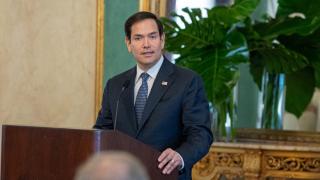Feb. 21, 2025 (EIRNS)—During an interview published Feb. 20, Secretary of State Marco Rubio continued the trend of throwing out the neocon doctrine of the sole unipolar hegemon imposed after the Cold War. After chastising the Biden Administration for having cut nearly all diplomatic relations with Russia, he said: “W]e ultimately have to be able to talk to a nation that has, in some cases, the largest tactical nuclear weapons stockpile in the world and the second largest, if not the largest, strategic nuclear weapons stockpile in the world…. [W]hether we like it or not, Russia is a power, a global power." Similarly, the [U.S. has rejected language that includes references to ”Russian aggression" both for an upcoming statement for a virtual summit between G7 leaders and for a resolution at the UN.
This follows events of the past days that have been chock-full of actions by the Trump Administration which are upending the current world order. Tellingly, the British establishment—long the architect of the waning neoliberal world—are beyond hysterical. The U.S.-U.K. “special relationship” is being “vaporized in front of our eyes,” wrote former British Foreign Office Minister of State and now CEO of the U.K.’s Canning House, Jeremy Browne. And the BBC wrote: “We are living in a U.S. presidency which is based on great power diplomacy. If we can work within that, fine. If not, God help us.” In the coming days, both the U.K.’s Keir Starmer and France’s Emmanuel Macron will be travelling to the U.S. in an attempt to woo Trump.
Then there’s the plight of pure insanity expressed by, for example, The Economist’s lead article in their current magazine, which demands that the U.K. and France “use their nuclear weapons to shield the continent” in the event that the U.S. under Trump makes a deal with Russia and “abandons” Europe. This view is expanded upon in an article in The Telegraph. Friedrich Merz, leader of Germany’s CDU and likely the next chancellor following this Sunday’s election, is quoted asking the same question, whether the British and French nuclear umbrella “could also apply to us.” Other “experts” quoted in the article conclude that Europe must quickly expand its prowess in tactical nuclear weapons in order to fight the coming war with Russia.
Stop for a moment before you decide whether these statements are reckless and dangerous, or whether they are laughable and absurd, given Europe’s current predicament. Instead, notice that these are an expression of a worldview which has failed. As Helga Zepp-LaRouche said during the Feb. 21 meeting of the International Peace Coalition, the varied responses to what President Trump is doing indicate that there is a “deeper axiomatic change” occurring. Resist the temptation to think that these are mistakes being made by individuals, or countries, or in the understanding of a particular “issue,” and instead see those mistakes as an expression of the underlying thought process which controls, and often dooms, a given society.
Lyndon LaRouche wrote in his January 1997 “Return to the Machine-Tool Principle”:
“Summarily, the application of the Socratic dialectical method to any mutually not-inconsistent array of propositions in geometry, leads to adducing an underlying set of definitions, axioms, and postulates. All possible propositions which are not inconsistent with each and all of the set of definitions, axioms, and postulates, constitutes a theorem-lattice; the set of definitions, axioms, and postulates, so employed, constitutes an hypothesis. There is no system of mathematical, or other thought, which is not determined, so, by an efficiently determining, underlying hypothesis.
“In economics, as in experimental physics generally, any fact of nature which cannot be made efficiently consistent with existing generally accepted physical assumptions, constitutes a paradox: the fact exists, in stubborn defiance of pre-existing opinion’s most hysterical efforts to deny the very possibility of its existence. Such paradoxes are the stuff of which valid experimental physics, and economics, is made.” LaRouche might have added to this list, history as well. The reason is the following.
Once a paradox in an underlying axiomatic structure is identified, one cannot simply add it to one’s existing lattice-work of assumptions, as if one were simply updating a data spreadsheet with new information. Rather, LaRouche writes: “[W]e must generate an entirely new hypothesis, in consideration of the way in which the newly discovered principle impacts each and every item of definition, axiom, and postulate of the superseded hypothesis.”
Thus, the world sits on the brink of a new era, a new paradigm, waiting to be brought into existence over the ashes of a dying and failed paradigm. Bringing such a new hypothesis into existence must be the guiding mission for any serious political force today. This activity must not merely seek to solve the individual “issues” or conflicts gripping the world, nor to simply banish those responsible for causing them, but must use the increasingly-obvious paradoxes in today’s popular culture to shatter their failed underlying axiomatic beliefs and replace it with a more scientifically truthful one. This process, and not Donald Trump, will be the driving force in history if we act upon it.
A good place to start for such an investigation is Helga Zepp-LaRouche’s Ten Principles of a New International Security and Development Architecture.






